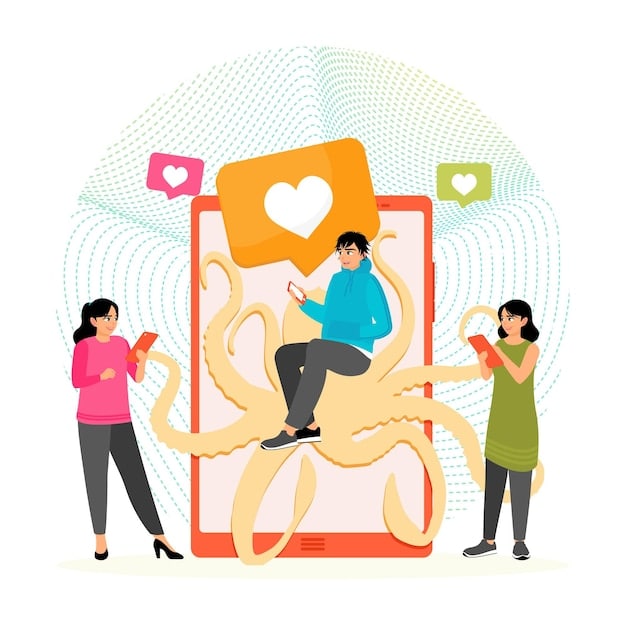Navigating Social Media: A Guide to Mindful Usage for Mental Health

Navigating social media’s impact on mental health requires mindful strategies such as setting time limits, curating your feed, engaging in real-life interactions, and practicing self-awareness to mitigate negative effects and promote well-being.
In today’s digital age, social media has become an integral part of our lives. However, understanding and navigating social media’s impact on mental health: a guide to mindful usage is crucial for maintaining a healthy balance and fostering well-being in the face of constant connectivity.
Understanding Social Media’s Dual Impact
Social media’s influence on our lives is undeniable. While it offers numerous benefits, it also presents potential challenges to our mental well-being. Recognizing this duality is the first step towards mindful usage.
The Positive Side of Social Media
Social media platforms offer several advantages. They connect us with friends and family, provide access to valuable information, and foster communities built around shared interests.
The Negative Side of Social Media
Conversely, excessive social media use can contribute to feelings of anxiety, depression, and social isolation. Cyberbullying, unrealistic comparisons, and fear of missing out (FOMO) are just a few of the potential downsides.

To better understand the intricacies, consider these points:
- Connection and Community: Social media can foster connections with like-minded individuals and provide support networks.
- Information Access: Platforms offer access to news, educational content, and diverse perspectives.
- Creative Expression: Users can express themselves creatively through various mediums like photos, videos, and writing.
- Potential for Comparison: The curated nature of social media can lead to unrealistic comparisons and feelings of inadequacy.
In conclusion, recognizing both the positive and negative aspects of social media is fundamental for developing a balanced and mindful approach to its usage.
Setting Boundaries for Mindful Usage
Establishing clear boundaries is essential for maintaining a healthy relationship with social media. These boundaries involve setting time limits, curating your feed, and prioritizing real-life interactions.
Time Management Strategies
One of the most effective strategies is setting daily or weekly time limits for social media use. Numerous apps and tools can help you track and manage your screen time effectively.
Curating Your Social Media Feed
Take control of what you see on your feed by unfollowing accounts that trigger negative emotions or promote unrealistic standards. Prioritize content that inspires, educates, and uplifts you.
Here are some actionable tips:
- Use Built-in Tools: Most platforms offer tools to monitor and limit your time on the app.
- Schedule Social Media Time: Allocate specific times during the day for social media use and stick to them.
- Unfollow or Mute: Unfollow or mute accounts that make you feel insecure or unhappy.
- Seek Positive Content: Actively search for accounts that promote positivity, self-acceptance, and well-being.
By setting boundaries, you create a healthier online environment that supports your mental and emotional well-being.
The Impact of Social Comparison
Social comparison is a natural human tendency, but it can be particularly detrimental on social media where curated and often unrealistic portrayals of success and happiness abound.
Understanding Upward and Downward Comparisons
Upward comparisons (comparing ourselves to those we perceive as better off) can lead to feelings of inadequacy and envy. Downward comparisons (comparing ourselves to those we perceive as worse off) can provide temporary boosts to self-esteem but can also be condescending.
Strategies for Combating Negative Comparisons
Cultivating self-awareness and practicing gratitude are powerful tools for combating negative social comparisons. Remind yourself that social media often presents an idealized version of reality.

To mitigate the effects of social comparison, consider these practices:
- Practice Gratitude: Regularly reflect on the things you are grateful for in your own life.
- Cultivate Self-Compassion: Treat yourself with the same kindness and understanding you would offer a friend.
- Focus on Personal Growth: Shift your focus from comparing yourself to others to pursuing your own goals and passions.
- Limit Exposure: Reduce your engagement on platforms where you find yourself constantly comparing yourself to others.
By recognizing and addressing the impact of social comparison, you can protect your self-esteem and nurture a healthier sense of self.
Cultivating Real-Life Connections
While social media can facilitate connections, it’s essential to prioritize real-life interactions. Nurturing offline relationships provides deeper emotional support and fosters a sense of belonging.
Prioritizing Face-to-Face Interactions
Make an effort to spend quality time with friends and family in person. Engage in activities that bring you joy and allow you to connect on a deeper level.
Strengthening Existing Relationships
Invest time and energy into strengthening your existing relationships. Reach out to loved ones, offer support, and be present in their lives.
Consider these avenues to enhance real-life connections:
- Schedule Regular Meetups: Plan regular outings or gatherings with friends and family.
- Engage in Shared Activities: Participate in hobbies, sports, or volunteer work with others.
- Practice Active Listening: Give your full attention to others when they are speaking and show genuine interest in their thoughts and feelings.
- Be Present: Put away your phone and focus on the moment when spending time with loved ones.
By prioritizing real-life connections, you can build a strong support system and experience the profound benefits of authentic human interaction.
Mindfulness and Self-Awareness Techniques
Practicing mindfulness and self-awareness can help you become more attuned to your emotional responses to social media. These techniques empower you to make conscious choices about your usage and protect your mental well-being.
Mindful Scrolling
Pay attention to how you feel while scrolling through social media. Notice any sensations of anxiety, sadness, or envy. If you experience negative emotions, take a break or adjust your feed.
Self-Reflection Practices
Regularly reflect on your social media habits and their impact on your life. Ask yourself questions like: “How does social media make me feel?” and “Am I using social media in a way that aligns with my values?”
Incorporate these practices into your daily routine:
- Journaling: Write about your thoughts and feelings related to social media.
- Meditation: Practice mindfulness meditation to cultivate awareness of your thoughts and emotions.
- Digital Detox: Take regular breaks from social media to disconnect and recharge.
- Set Intentions: Before using social media, set a clear intention for what you hope to gain from the experience.
By cultivating mindfulness and self-awareness, you can develop a more intentional and balanced relationship with social media.
Seeking Support and Professional Help
If you are struggling with the impact of social media on your mental health, don’t hesitate to reach out for support. Many resources are available to help you navigate these challenges.
Identifying When to Seek Help
Recognize the signs that social media is negatively affecting your mental health. These may include increased anxiety, depression, sleep disturbances, and social isolation.
Available Resources
Numerous organizations and mental health professionals offer support and guidance for managing social media use. Online therapy platforms provide convenient access to licensed therapists.
Explore these options:
- Mental Health Professionals: Consult with a therapist or counselor who specializes in treating anxiety, depression, and social media-related issues.
- Support Groups: Join a support group for individuals struggling with social media addiction or related mental health challenges.
- Online Resources: Explore websites and apps that offer information, tools, and support for mindful social media usage.
- Helplines: Contact a mental health helpline or crisis hotline for immediate support.
Remember, seeking help is a sign of strength, and there are people who care and want to support you on your journey to well-being.
Promoting a Healthier Online Culture
Creating a healthier online culture requires collective effort. By promoting positivity, empathy, and responsible online behavior, we can contribute to a more supportive and uplifting digital environment.
Leading by Example
Be mindful of your own online behavior and strive to create positive interactions. Avoid engaging in negativity, spreading rumors, or participating in cyberbullying.
Supporting Others
Stand up for others who are being targeted or harassed online. Offer support, report abusive content, and promote empathy and understanding.
Take action in these areas:
- Promote Positive Content: Share uplifting stories, inspirational messages, and resources for mental health and well-being.
- Report Abusive Behavior: Report accounts and content that violate community guidelines or promote hate speech.
- Practice Empathy: Consider the impact of your words and actions on others before posting online.
- Advocate for Change: Support organizations and initiatives that promote digital literacy, responsible social media usage, and mental health awareness.
By promoting a healthier online culture, we can collectively create a digital environment that supports well-being and fosters positive connections.
| Key Point | Brief Description |
|---|---|
| ⏰ Set Time Limits | Allocate specific times for social media use to prevent overuse. |
| 😊 Curate Your Feed | Unfollow or mute accounts that trigger negative emotions. |
| 🤝 Real-Life Connections | Prioritize face-to-face interactions for deeper emotional support. |
| 🤔 Self-Awareness | Practice mindfulness to understand your emotional responses. |
FAQ
▼
Start by setting daily time limits using built-in app features or third-party apps. Remove social media apps from your phone’s home screen and schedule specific times each day to check them.
▼
Take a break from social media immediately. Engage in relaxing activities like deep breathing or meditation. Unfollow or mute accounts that trigger your anxiety and seek supportive content.
▼
Remind yourself that social media presents an idealized version of reality. Focus on your own personal growth and achievements, and practice gratitude for what you have in your life.
▼
Real-life connections provide deeper emotional support and a greater sense of belonging. Face-to-face interactions foster stronger relationships and improve overall mental well-being.
▼
If social media is significantly impacting your mood, sleep, or relationships, and you’re struggling to manage its effects on your own, consider reaching out to a mental health professional for guidance and support.
Conclusion
In conclusion, navigating social media’s impact on mental health requires a mindful and intentional approach. By setting boundaries, cultivating self-awareness, prioritizing real-life connections, and seeking support when needed, we can harness the benefits of social media while safeguarding our mental well-being.





